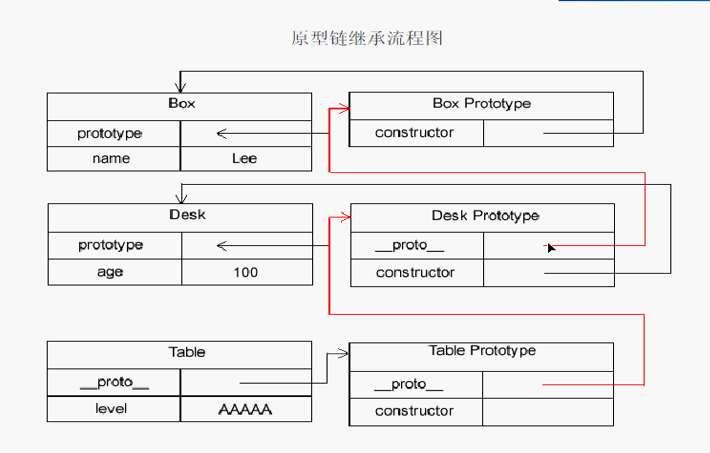继承是面向对象的一个核心概念,其他主要面向对象的继承主要靠两种方式实现继承 一种是继承 另一种是接口实现
一.原型继承
function Box(){
this.name=‘lll’; //被继承的函数叫做超类型(父类型 基类)
}
function Desk(){ //继承的函数叫做子类型(子类,派生类)
this.age=100;
}
Desk.prototype=new Box();
var desk=new Desk();
alert(desk.name);
function Table(){
this.address='lol';
}
Table.prototype=new Desk();
var table=new Table();
alert(table.name);

Desk 的原型获得是Box()的实例和原型 以此类推
就近元则:先查询实例有没有该属性 ,然后在查找原型里面是否还有该属性
alert(desk instanceof Box) true
二.借用构造函数(对象冒充函数)
解决引用共享和超类型传参数的问题
functon Box(name,age){
this.name=name;
this.age=age;
//this.family=['哥哥','姐姐','弟弟']
}
Box.prototype.family='家庭';
function Desk(){
Box.call(this,'lll',100);
}
var desk=new Desk();
alert(desk.name);
alert(desk.family) 对象冒充解决了共享问题和传参数的问题 但是只能继承实例的问题 不能继承原型 方法放在构造里,浪费空间,每次实例化都分配地址
三.组合继承(对象冒充继承和原型继承)
functon Box(name,age){
this.name=name;
this.age=age;
//this.family=['哥哥','姐姐','弟弟']
}
Box.prototype.run(){
return this.name+this.age;
}
function Desk(){
Box.call(this,'lll',100);
}
Desk.prototype=new Box();
var desk=new Desk();
alert(desk.name);
alert(desk.family)
alert(desk.run())
四.原型继承
function obj(0){ //中转函数
function F(){} 用来存储传递过来的对象
F.prototype=o;
return new F();
}
var box={
name:'lll';
age:100;
family:['哥哥' ,'姐姐']
}
var box1=obj(box) box1 等于new F();
alert(box1.family);
box1.push('弟弟')
alert(box1.family);
var box2=obj(box);
alert(box2.family); 引用类型属性共享了
五.寄生式继承(原型加工厂模式)
function obj(o){ //中转函数
function F(){} 用来存储传递过来的对象
F.prototype=o;
return new F();
}
function create(o){ //寄生式继承
var f=obj(o);
f.run=function(){
return this.name
}
return f;
}
var box={
name:'lll';
age:100;
family:['哥哥' ,'姐姐']
}
var box1=create(box);
alert(box1.name)
六寄生组合继承
function create(box, desk) {
var f = obj(box.prototype);
f.constructor = desk; //调整原型构造指针
desk.prototype = f;
}
function Box(name, age) {
this.name = name;
this.age = age;
}
Box.prototype.run = function () {
return this.name + this.age + '运行中...'
}
function Desk(name, age) {
Box.call(this, name, age); //对象冒充
}
//通过寄生组合继承来实现继承
create(Box, Desk); //这句话用来替代Desk.prototype = new Box();
var desk = new Desk('Lee', 100);
alert(desk.run());
alert(desk.constructor);